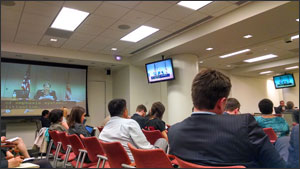EEOC Hearing Examines Social Media in the Workplace and Implications for Equal Employment Opportunity Law

The lines between employees’ public and private lives have become increasingly blurred, which has led to a complex dialogue around the enforcement of equal employment opportunity laws. During a recent open meeting at the U.S. Equal Employment Opportunity Commission (EEOC), panelists were invited to discuss a wide range of issues including recruitment and hiring, harassment, records retention and discovery. I attended on behalf of DirectEmployers Association and wanted to share some of the highlights.
(Pictured left: Lobby area outside of the meeting room at the EEOC Washington, D.C. office)
The panelists included:
- Carol Miaskoff, Acting Associate Legal Counsel, EEOC, Office of Legal Counsel
- Rita Kittle, Senior Trial Attorney, EEOC Denver Field Office (via video teleconference)
- Lynne Bernabei, Partner, Bernabei & Wachtel PLLC
- Renee Jackson, Associate and Social Media & Technology in the Workplace team lead within the Labor and Employment practice group, Nixon Peabody LLP
- Jonathan Segal, Partner, Duane Morris LLP; Managing Principal, Duane Morris Institute, testifying on behalf of the Society for Human Resource Management
Coincidentally, this was the first hearing that the EEOC live tweeted, and encouraged others to join via the hashtag #socialEEOC. Do a query for the hashtag and you’ll get a great play-by-play of the discussion in addition to the follow-up analysis and blog posts.
EEOC Commissioner Victoria Lipnic made it clear that the meeting was meant to be a listening session to learn about issues and that no guidance would be issued.
One statistic cited by EEOC Commissioner Jenny Yang was that millennials account for 36% of the U.S. workforce, and by 2025, they will account for 75%. She was interested in how social media can be used in discovery and how policies can inform employees while balancing employer concerns. Throughout the meeting there was in-depth discussion about the burden that plaintiffs cope with during excessive discovery requests.
 (Pictured right: Rita Kittle speaking via video teleconference during the meeting.)
(Pictured right: Rita Kittle speaking via video teleconference during the meeting.)
Rita Kittle shared her insight as a Senior Trial Attorney, EEOC Denver Field Office, and explained some of the challenges of using social media in discovery including Facebook blocking and deletions. Kittle said the biggest difficulty is determining the parameter of searches on social media. The amount of time spent combing through social media content and profiles can be substantial – plus, it’s difficult to define what is relevant to litigation – so it’s important to negotiate the search parameters at the beginning of a case. Her overarching concern is that people will fear or be discouraged from participating in EEOC cases if they think it means all of their private communications and interactions will be accessible by their current or former employer.
Carol Miaskoff, Acting Associate Legal Counsel, EEOC, Office of Legal Counsel, stated that 30 states have or are considering laws preventing employers from getting employees’ personal social media passwords. She also advised that employers are subject to EEO laws, regardless of the media they happen to use. In addition, she cited the recent joint statement between the EEOC and Federal Trade Commission (FTC) regarding background checks. Per the EEOC press release, “This is the first time that the two agencies have partnered to create resources addressing concerns in this key area. The documents are available on the EEOC's website: Background Checks: What Employers Need to Know and Background Checks: What Job Applicants and Employees Should Know.”
Renee Jackson, Associate and Social Media & Technology in the Workplace team lead within the Labor and Employment practice group, Nixon Peabody LLP, remarked that she advises employers to add social media to the mix of recruitment tools they use, and suggests search post offer. When working with companies, she tells them to apply the same discrimination, harassment, and retaliation concepts to social media.
Jonathan Segal, Partner, Duane Morris LLP; Managing Principal, Duane Morris Institute, who testified on behalf of the Society for Human Resource Management (SHRM), covered social media use in the workplace for screening and background checks. He acknowledged the many positive effects of social media in the workplace: it promotes workplace flexibility by leveling the communication between in-house and remote employees; and it’s growing in use as a tool for knowledge sharing within organizations, for marketing and crisis communications. He went on to explain that some employers use social media to recruit candidates by publicizing job openings and some for background checks. Segal said that it’s not the looking that’s the legal issue, but what the employer does or doesn’t do with what it discovers.
A SHRM 2013 study discovered that 77% of companies indicated using social networking sites to recruit candidates for specific jobs. Segal shared more stats from SHRM research, including the fact that 94% of recruiters use LinkedIn, 54% use Facebook and 39% use Twitter to find talent. “To ignore social media today is like ignoring e-mail 20 years ago,” said Segal.
A study from Carnegie Mellon University was mentioned a few times throughout the discussion about the effects of social media screening – definitely worth the read.
As the conversation progressed, newer apps such as Snapchat were mentioned. These types of mediums create even more hurdles as they give users the ability to share self-destructing messages and photos.
(Pictured below: Attendees continuing the conversation after the hearing wraps up.)
During the closing remarks, Feldblum stated that, “Every tweet is a choice.” Definitely something to ponder as the topic of social media in the workplace continues to be scrutinized. She expressed that federal sector cases will be useful means in having the Commission provide guidance.
Check out some additional articles that were written about the public meeting and let us know what you think. Should the EEOC provide guidance to employers? Have you implemented training for your recruiters on social media screening?
- EEOC Press Release: Social Media Is Part of Today’s Workplace but its Use May Raise Employment Discrimination Concerns
http://eeoc.gov/eeoc/newsroom/release/3-12-14.cfm - The Employer Handbook: What the EEOC wants companies to know about social media and employment discrimination
http://www.theemployerhandbook.com/2014/03/what-the-eeoc-wants-you-... - Federal News Radio: Think before you post: EEOC cases show pitfalls of social media in the workplace
http://www.federalnewsradio.com/239/3580540/Think-before-you-post-E...
Special thanks to Edward Loughlin, Senior Trial Attorney, Office of the General Counsel, EEOC, for being such a wonderful resource for our Association.
Subscribe
All the recruiting news you see here, delivered straight to your inbox.
Just enter your e-mail address below
RecruitingBlogs on Twitter
Groups
-
Recruiters On LinkedIn
1801 members
-
Corporate Recruiters
316 members
-
Recruiting tips for begi…
180 members
-
The Recruiting Bar
190 members
-
Recruiting Humor
222 members
-
News from the Recruiting…
34 members
-
Contractors Recruitment
62 members
-
Recruitment Process Outs…
194 members
-
Virtual Recruiters Netwo…
619 members
-
Independent Recruiters
530 members
© 2025 All Rights Reserved
Powered by
![]()
Badges | Report an Issue | Privacy Policy | Terms of Service
About
With over 100K strong in our network, RecruitingBlogs.com is part of the RecruitingDaily.com, LLC family of Recruiting and HR communities.
Our goal is to provide information that is meaningful. Without compromise, our community comes first.
Join the Network!
RecruitingDaily.com
One Reservoir Corporate Drive
4 Research Drive – Suite 402
Shelton, CT 06484
Email us: info@recruitingdaily.com

You need to be a member of RecruitingBlogs to add comments!
Join RecruitingBlogs